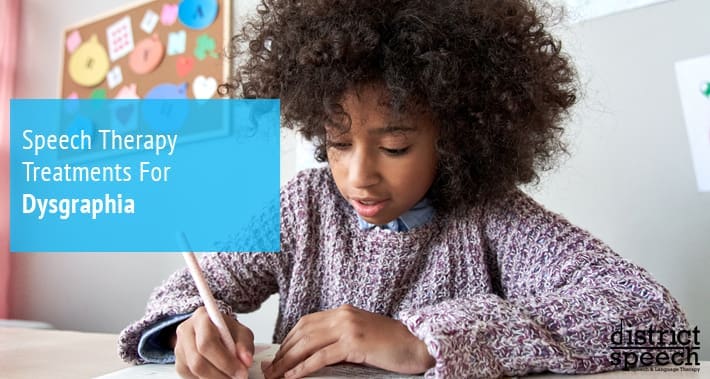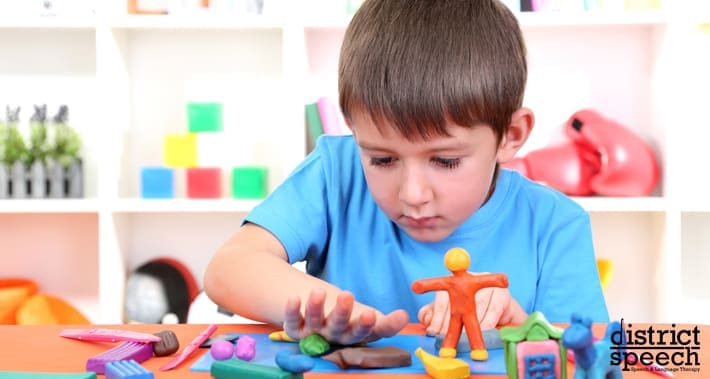
Dysgraphia is a condition that affects handwriting.
Our Washington DC speech therapy clinic offers excellent reading and learning disability therapy customized to your child’s specific needs.
We understand the challenges that come with dysgraphia and are here to support you and your child every step of the way.
Our experienced team of speech-language pathologists can work closely with you to develop a personalized treatment plan that targets your child’s unique challenges.
Let’s take a closer look at dysgraphia on this week’s speech therapy blog, and how we can help.
What is Dysgraphia?
Dysgraphia is a condition characterized by impaired handwriting.
Having impaired handwriting can create challenges in your child’s ability to learn how to spell words and affect their speed of writing.
This can create issues in your child’s progression in school, as well as their social development.
What Causes Dysgraphia?
Current research has shown a connection between orthographic coding and working memory as it relates to handwriting.
Orthographic coding here means the ability to store written words in your working memory while the letters in the words are analyzed by your brain.
This creates a permanent memory of written words, which links their pronunciation and meaning.
It’s a disruption in this process that causes dysgraphia in children.
Speech therapy for adults with dysgraphia is less common, but it still exists.
If you develop dysgraphia as an adult, the cause is almost always a traumatic brain injury, like from an automobile accident or a stroke.
What Are The Symptoms Of Dysgraphia?
If your child has dysgraphia, they might have challenges with only handwriting, or only spelling, but not reading difficulties associated with dysgraphia.
It’s also possible for them to have both impaired handwriting and spelling.
This can look like incorrectly ordering the words in sentences.
Your child may also have difficulty planning sequential finger movements like the touching of their thumb to each finger on the same hand.
If your child is consistently having trouble focusing along with these symptoms, it could indicate the presence of a speech or language disorder.
Do Children With Dysgraphia Commonly Have Other Learning Disabilities?
Children with dysgraphia can have other learning disabilities.
One commonly found disorder with dysgraphia is attention deficit hyperactivity disorder.
There are a number of subtypes of this disorder, but they can all occur with dysgraphia.
As a result, speech therapy for ADHD often involve treatment for dysgraphia as well.
RELATED: FAQs About ADHD
Another commonly found learning disability with dysgraphia is dyslexia, which is related to reading.
Dyslexia and dysgraphia are two distinct neurological conditions, though they’re easy to confuse because they share symptoms and often occur together.
It’s possible to have both learning disabilities, but it’s important to see a speech therapist to confirm which your child has.
If your child has dysgraphia, they may also exhibit signs of hyperlexia, another learning disability characterized by advanced reading skills but difficulty with comprehension.
Dysgraphia may be linked to speech and language issues common in premature babies.
Some children with dysgraphia may also have an articulation disorder, which affects their ability to produce speech sounds correctly.
Children with both dysgraphia and dyslexia will have challenges with focus, switching attention, sustained attention, and orthographic coding.
In adults, dysgraphia may co-occur with acquired apraxia of speech, again often resulting from brain injury or stroke.
If your child exhibits any of these symptoms along with signs of a speech disorder, it’s important to consult with a professional.

What Sorts Of Interventions Help With Dysgraphia
There are a number of interventions that can help with dysgraphia.
An intervention is an accommodation to help with a particular challenge.
While your young child is learning to write, some interventions to help them learn include:
- Using clay as a form of play to strengthen their hand muscles
- Tracing letters using different tools like their finger or a pencil
- Copying out letters
- Connecting dots and dashes to create complete letters
Once your child has the ability to form legible letters, you should have them move on to instructions that help them develop automatic letter writing.
This is because this is where they will initially have the greatest challenge.
A useful study intervention with each letter of the alphabet includes the following steps:
- Memorize numbered arrow cues that provide a blueprint for letter formation
- Cover the letter and have them imagine the letter with the arrow cues
- Write out the letter from memory after intervals that gradually increase as they improve
Once your child has got the hang of this, you can start dictating letters to them to write out without any aids.
Now, let’s quickly dive into some other types of interventions that vary based on the setting.
Academic Interventions For Dysgraphia
Some academic interventions for dysgraphia include:
- Allowing your child to take extra time on tests
- Providing lots of worksheets for them to practice
- Not grading them on neatness
These are some recommendations you can pass along to your child’s teacher if they are unsure what sort of accommodation your child with dysgraphia needs to succeed academically.
At Home Interventions For Dysgraphia
While your child is growing up, the following are some very important interventions for dysgraphia that you can introduce:
- Teach them to get a good grip on their writing utensil
- Be a scribe for your child if their workload is too much and they are too slow
- Teach your child how to effectively type
Typing is probably the most important skill you can teach your child because they will need the speed advantage as they grow and go through higher levels of education.
Incorporating at-home speech therapy exercises into your child’s routine can further support their progress.
At Work Interventions For Dysgraphia
Finally, even adults with dysgraphia require interventions to help them succeed at work.
Some interventions to suggest if you’re struggling to keep up at work include:
- Ask to use reference materials to make everyday compositions easier
- Have a supervisor or coworker proofread important written material before it’s sent out
- Use a text to speech software if your typing skills are too slow
- Ask to prioritize verbal communication wherever possible
Remember, the goal is to help make your work easier so that it doesn’t needlessly stress or exhaust you.
Book Your Appointment With District Speech Today
You can see there are a number of great strategies to use if you or your child has dysgraphia at any stage of life.
If you notice any signs that your child should see a speech therapist, don’t hesitate to reach out for help.
If you suspect your child may have dysgraphia or another learning disability, early intervention is key to helping them succeed.
Speech therapists specializing in pediatric dysgraphia work with all manner of conditions linked to communication, including dysgraphia.
This is especially helpful if your child is having difficulty with their fine motor skills as they learn to write and the above strategies are not enough.
At District Speech, we have a team of highly specialized pediatric speech therapists ready to help your child thrive.
Book your appointment with District Speech today and let us help your child reach their full potential.
1300 I St NW, Suite 400 E,
Washington, DC 20005
- https://g.page/districtspeech
District Speech and Language Therapy specializes in speech therapy, physical therapy, and occupational therapy solutions, for both children and adults, in the Washington D.C and the Arlington Virginia areas.